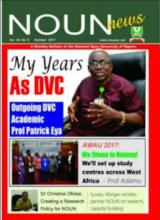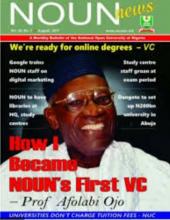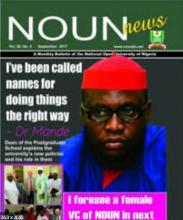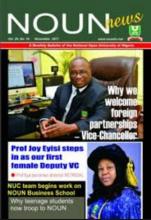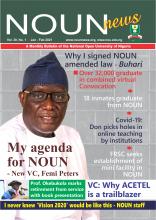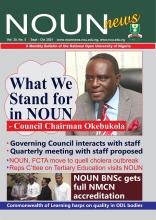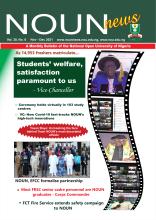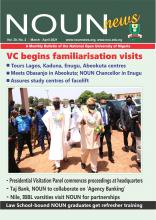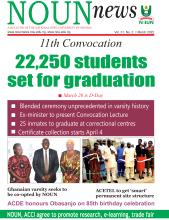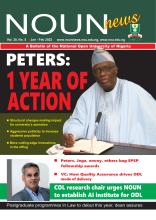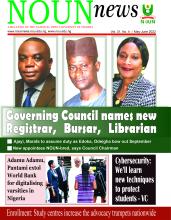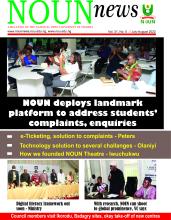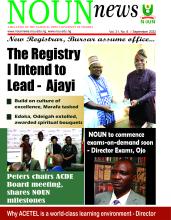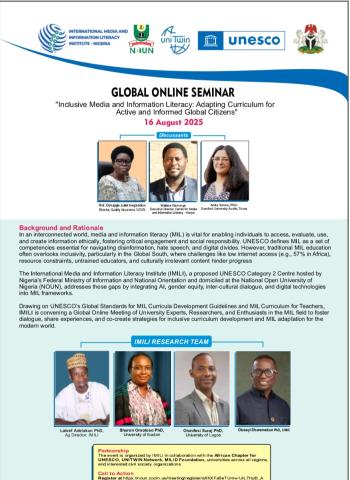
The International Media and Information Literacy Institute (IMILI), domiciled at the National Open University of Nigeria (NOUN), in partnership with the Federal Ministry of Information and National Orientation, UNESCO Nigeria, and the African Group of the UNESCO University Network on Media and Information Literacy, has convened a global online seminar on Inclusive Media and Information Literacy and Pursuit of Information Integrity: Adapting Curriculum for Active and Informed Global Citizens.
In his opening remarks, Dr. Lateef Adelakun, Acting Director of IMILI, described the institute as a centre of excellence rooted in UNESCO’s global standards for IMIL, stating that IMILI, domiciled at NOUN and hosted by Nigeria’s Federal Ministry of Information and National Orientation, was established to provide research-driven solutions for media education and public engagement.
Dr. Adelakun cautioned that while digital media and artificial intelligence have opened new avenues for communication and civic participation, they have also unleashed challenges.
“The rapid spread of information without adequate verification has led to distortions of truth, misinformation, manipulation and even online exploitation,” he said.
He highlighted the need to balance legislation and education in tackling media abuse, insisting that IMIL equips individuals with the competencies to access, analyse, evaluate and responsibly create media content, urging participants to use the seminar as an opportunity to strengthen their capacity and become ambassadors of information integrity.
The representative of UNESCO Abuja, Ms. Yachat Nuhu, Officer-in-Charge of the Communication and Information Sector, expressed UNESCO’s delight in being part of the programme, stressing that UNESCO has always advocated for the integration of IMIL into national curricula, given its role in promoting democracy, tolerance, and social cohesion.
She described the seminar as timely, noting that media literacy is essential for all societies in an era of rapid digital expansion, adding that UNESCO looks forward to actionable recommendations that will emerge from the discussions.
Nuhu affirmed the organisation’s readiness to continue supporting IMILI and its partners in championing inclusivity in education.
Delivering the keynote address, Dr. Oluseyi Soremekun, National Officer at the United Nations Information Centre, described IMIL as a civic necessity rather than a mere skillset, highlighting that media shapes public opinion, identity and civic behaviour, and that without proper literacy, misinformation threatens both democracy and public trust.
Dr. Soremekun explained that inclusivity in IMIL means ensuring representation, accessibility and cultural relevance in curriculum design, noting that curricula must address the needs of all learners, urban or rural, male or female, privileged or disadvantaged.
“Inclusivity ensures that no one is left behind in acquiring the critical competencies needed to evaluate and responsibly engage with media and information,” he said.
The keynote speaker went further to link the seminar’s theme to the global information disorder, where disinformation, propaganda, and conspiracy theories thrive unchecked, arguing that information integrity must be the foundation of media and information literacy, because without integrity, information becomes a weapon of manipulation rather than a tool for empowerment.
Soremekun urged participants to go beyond theory and translate discussions into concrete action, encouraging universities to pilot new IMIL curricula that reflect inclusivity, and urged educators to embrace critical pedagogy that equips students to question information systems, and challenge policymakers to legislate in favour of transparency and media accountability.
- Log in to post comments
- 159 views

